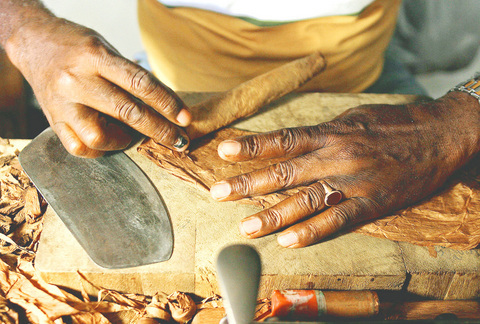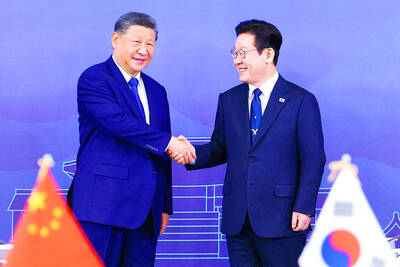When Cuban immigrants moved to this city in the early 1980s, they brought with them their language and traditions, and their love for good, affordable cigars.
Soon several little storefront tabaquerias cropped up, with an owner and maybe an assistant hand-rolling cigars in the back, then selling them from a counter in front.
But today, while Spanish is still commonly heard -- although often studded with the cadences of New Jersey -- the region's cigar makers are fading into memory.

PHOTO: AFP
Jose Suarez's Boquilla Cigar Shop on Bergenline Avenue may be the last such shop in Union City. Cuba Aliados Cigars still has a retail presence but moved its production to Honduras more than a decade ago.
street sales
Now 72, Suarez said his trade has been assailed by high tobacco taxes and the unregulated street sales of premium cigars.
"I'm fighting, trying to maintain my business," Suarez said. "But if things continue as they have, I might have to close, too."
The older gents who used to favor the US$2 cigars most popular at La Boquilla are dying off. The new generation of aficionados favor posh shops selling premium cigars at several times that price -- usually hand-rolled in Honduras, the Dominican Republic, or other climes closer to tobacco fields and inexpensive labor.
Union City's Cuban population has declined substantially in the past quarter-century. Emilio del Valle, a top municipal staffer and founder of the Cuban Day Parade, said Cubans peaked between 60 to 70 percent of the city's population in the 1980s. According to 2000 Census data, 14 percent of Union City's 80,589 documented residents claim Cuban ancestry. Hispanics as a whole comprise 75 percent. Within one block of Suarez's shop are restaurants and bakeries proclaiming heritage from Guatemala, Peru, Mexico and Ecuador.
And in the US, there's scarcity of would-be tabaquero apprentices wanting to learn the painstaking but poor-paying craft of cigar rolling.
"It's not surprising they're having difficulties," said Norman Sharp, of the decline of the storefront cigar makers. Sharp is president of the Cigar Association of America, which represents cigar makers, importers and suppliers. "It stopped being economical to hand-roll cigars in this country decades ago."
Machines began replacing human hands in the 1950s. In the US, Sharp said, 94 percent of the cigars sold are machine-made in such factories as Swisher in Jacksonville, Florida, and John Middleton in King of Prussia, Pennsylvania.
popular with police
At Jimenez Tobacco in downtown Newark, New York; Nelda Pozo and an assistant roll a slightly pricier variety of cigars that are popular with police officers and lawyers frequenting the nearby courthouses. While the business supports her as it did her family for a century earlier in eastern Cuba, Pozo said her now-grown children have pursued other careers. So, too, has Suarez's stepson.
Back in Union City, Suarez continues alone the trade he began learning at age 11 in Placetas, Cuba. One large tobacco leaf acts as a binder around bits of specially aged tobacco, while a second trimmed leaf provides the outer wrapper. The cigars are then stacked and pressed in decades-old wooden boxes. Suarez said he produces about 150 cigars in an eight-hour day.
Despite its name, Boquilla's top-selling Havana brand is a blend of tobaccos from the Dominican Republic, Honduras, Ecuador and Indonesia. The mythic Cuban leaf has not been legally imported into the US since President Kennedy imposed an embargo in 1962.
While cigars allegedly smuggled from Cuba are sold illicitly on the streets of Union City, Suarez said many are fakes. And even authentic Cuban tobacco is not of the quality he recalls before Fidel Castro nationalized the industry.
"It's not bad, but it's not good, either," he said. But mystique sells. Despite his distaste for Castro, if Cuban tobacco were to become legally available, Suarez said he'd sell it -- "because people are always asking for it."

‘CHILD PORNOGRAPHY’: The doll on Shein’s Web site measure about 80cm in height, and it was holding a teddy bear in a photo published by a daily newspaper France’s anti-fraud unit on Saturday said it had reported Asian e-commerce giant Shein (希音) for selling what it described as “sex dolls with a childlike appearance.” The French Directorate General for Competition, Consumer Affairs and Fraud Control (DGCCRF) said in a statement that the “description and categorization” of the items on Shein’s Web site “make it difficult to doubt the child pornography nature of the content.” Shortly after the statement, Shein announced that the dolls in question had been withdrawn from its platform and that it had launched an internal inquiry. On its Web site, Le Parisien daily published a

China’s Shenzhou-20 crewed spacecraft has delayed its return mission to Earth after the vessel was possibly hit by tiny bits of space debris, the country’s human spaceflight agency said yesterday, an unusual situation that could disrupt the operation of the country’s space station Tiangong. An impact analysis and risk assessment are underway, the China Manned Space Agency (CMSA) said in a statement, without providing a new schedule for the return mission, which was originally set to land in northern China yesterday. The delay highlights the danger to space travel posed by increasing amounts of debris, such as discarded launch vehicles or vessel

RUBBER STAMP? The latest legislative session was the most productive in the number of bills passed, but critics attributed it to a lack of dissenting voices On their last day at work, Hong Kong’s lawmakers — the first batch chosen under Beijing’s mantra of “patriots administering Hong Kong” — posed for group pictures, celebrating a job well done after four years of opposition-free politics. However, despite their smiles, about one-third of the Legislative Council will not seek another term in next month’s election, with the self-described non-establishment figure Tik Chi-yuen (狄志遠) being among those bowing out. “It used to be that [the legislature] had the benefit of free expression... Now it is more uniform. There are multiple voices, but they are not diverse enough,” Tik said, comparing it

RELATIONS: Cultural spats, such as China’s claims over the origins of kimchi, have soured public opinion in South Korea against Beijing over the past few years Chinese President Xi Jinping (習近平) yesterday met South Korean counterpart Lee Jae-myung, after taking center stage at an Asian summit in the wake of US President Donald Trump’s departure. The talks on the sidelines of the APEC gathering came the final day of Xi’s first trip to South Korea in more than a decade, and a day after his meeting with the Canadian prime minister that was a reset of the nations’ damaged ties. Trump had flown to South Korea for the summit, but promptly jetted home on Thursday after sealing a trade war pause with Xi, with the two